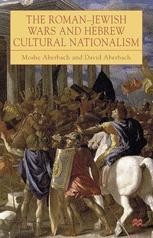I was looking for something about the Bar-Kokhba revolt. This wasn't quite it. However, it proved to be a very interesting and solid book about the causes and implications of that revolt and the earlier ones. The work includes perhaps the best short summary I've read on the leadup to the 66-70 Jewish War, but it does so with the intent of getting to its bigger point: how those wars changed Jewish culture.
The work is split into two parts, one on the causes of the conflicts (and the culture as it existed before them) and one on the responses to the conflicts. The first part was the stronger section. Aberbach and Aberbach explore both short-term and long-term causes of the conflict. They include bad (particularly local) Roman leadership, high taxation and poverty, a corrupt priesthood, demographic changes in Rome (the Jewish nation was growing at a much faster pace than the declining Roman population), the differing religious cultures, and the differing responses to Hellenism (Rome turned itself much more heavily toward Greek culture, whereas Jewish culture internalized Greek culture into its own; in other words, one was more heavily transformed by it, while the other transformed it into its own).
The destruction of the Jewish nation as a political entity meant the preserving the nation became much more of a cultural endeavour. In ridding the empire of the Jewish temple, ironically, the authors show, Rome helped to ensure that Judaism would survive, because it was forced to transform itself into something not beholden to a particular place, in turn also helping to unify Jewish culture.







